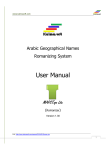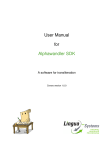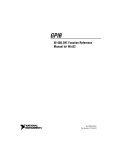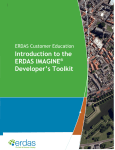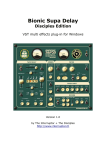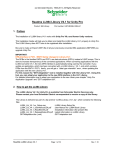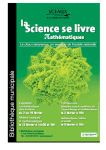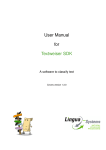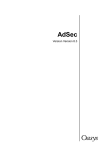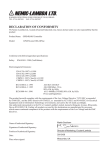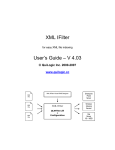Download Sprachinspektor SDK User Manual - Lingua
Transcript
User Manual for Sprachinspektor SDK A C/C++ software development kit to identify language and character encoding Covers version 4.0.0 Sprachinspektor SDK User Manual, published April 11, 2014. c 2010-2014, Lingua-Systems Software GmbH Copyright Lingua-Systems Software [email protected] GmbH, Gerichtsstraße 42, 44649 Herne, Germany, All rights reserved, especially changing or publishing parts of this manual needs prior written permission of the copyright owner. The rights to reproduce and publish unchanged copies in any form, to translate or to present the manual are granted. Mentioned hard- and software as well as companies may be trademarks of their respective owners. Use of a term in this manual should not be regarded as affecting the validity of any trademark or service mark. A missing annotation of the trademark may not lead to the assumption that no trademark is claimed and may thus be used freely. Great effort has been made in writing this manual. However, faults cannot be excluded in general. For any loss or damages caused or alleged to be caused directly or indirectly by errors or omissions in this manual, the authors and the publisher assume no responsibility and cannot be held liable. Neither can the authors or the publisher be held liable for the content or changes of content concerning the linked websites. The links have been carefully chosen and proved at the preparation of the manual. If you have problems using the links or get aware of any faults, feel free to give a brief hint on it via [email protected]. Contents 1. Introduction 5 2. Supported Languages and Character Encodings 6 3. Installation 3.1. Requirements . . . . . . . 3.2. What Will Be Installed . . 3.3. Installing the Software . . 3.4. Deinstalling the Software . . . . . . . . . . . . . . . . . . . . . . . . . . . . . . . . . . . . . . . . . . . . . . . . . . . . . . . . . . . . . . . . . . . . . . . . . . . . . . . . . . . . . . . . . . . . . . . . . . . . . . . . . . . . . . . . . . . . . . . . . . . . . . . . . . . . 9 9 9 9 9 4. Application Programming Interface 4.1. A Minimal Application . . . . . . 4.2. Important Data Structures . . . . 4.2.1. si_t . . . . . . . . . . . . . 4.3. Function Reference . . . . . . . 4.3.1. si_ffile() . . . . . . . . . . 4.3.2. si_fstr() . . . . . . . . . . 4.3.3. si_fwstr() . . . . . . . . . 4.3.4. si_fnstr() . . . . . . . . . . 4.3.5. si_free() . . . . . . . . . . 4.3.6. si_strerror() . . . . . . . . 4.3.7. si_version() . . . . . . . . 4.3.8. si_version_string() . . . . . . . . . . . . . . . . . . . . . . . . . . . . . . . . . . . . . . . . . . . . . . . . . . . . . . . . . . . . . . . . . . . . . . . . . . . . . . . . . . . . . . . . . . . . . . . . . . . . . . . . . . . . . . . . . . . . . . . . . . . . . . . . . . . . . . . . . . . . . . . . . . . . . . . . . . . . . . . . . . . . . . . . . . . . . . . . . . . . . . . . . . . . . . . . . . . . . . . . . . . . . . . . . . . . . . . . . . . . . . . . . . . . . . . . . . . . . . . . . . . . . . . . . . . . . . . . . . . . . . . . . . . . . . . . . . . . . . . . . . . . . . . . . . . . . . . . . . . . . . . . . . . . . . . . . . . . . . . . . . . . . . . . . . . . . . . . . . . . . . . . . . . . . . . . . . . . . . . . . . . . . . . . . . . . . . . . . . . . . . . . . . . . 10 11 11 11 12 12 12 13 13 14 14 14 14 5. Error Handling 5.1. Pseudo-Variable si_errno . . . . . . . . . . . . . . . . . . . . . . . . . . . . . . . . . . . . 5.2. si_errno_t Named Error Constants . . . . . . . . . . . . . . . . . . . . . . . . . . . . . . . 15 16 16 6. Hints on Application Development 6.1. Determining Sprachinspektor’s Version . . . . . . . . . . . . . . . . . . . . . . . . . . . . . 17 17 A. Example Application 18 B. References 19 . . . . . . . . . . . . About this manual This manual addresses users with experience in C/C++ programming and at least a basic knowledge of library usage. The manual provides a short introduction to the library, its supported languages and character encodings as well as instructions how to install the Sprachinspektor software package. Afterwards the complete API is introduced along with the possibilities of error handling. A complete usage example is attached in appendix A. For a quickstart have a look at the function reference in the documentation of the application programming interface (chapter 4.3 on page 12). Administrators who want to install the software get all necessary information in chapter 3, page 9. Conventions used in this Manual At several points of this manual it is necessary to make a distinction between strings that may not contain embedded NUL characters and those which may – due to their special charset – potentially contain NUL characters. In this manual, the former are called "Strings" while the latter are called "Byte Strings". Page 4 Lingua-Systems’ Sprachinspektor SDK v4.0.0 1. Introduction Sprachinspektor SDK provides a shared C/C++ library that identifies the language and character encoding of textual input. The input can either be a file or in various string formats. The library computes the results fast and reliable and has no software dependencies except for the standard C and thread library. Therefore Sprachinspektor SDK can be easily integrated on all supported platforms and works efficiently even on dated hardware. This version of the Sprachinspektor SDK library supports 29 languages and 39 encodings. Additionally Sprachinspektor SDK identifies 10 languages as well if they have been transliterated according to one of the supported standards. Lingua-Systems’ Sprachinspektor SDK v4.0.0 Page 5 2. Supported Languages and Character Encodings Currently, 29 languages are supported. encodings as well as deprecated ones. The supported 39 encodings cover commonly used Language ISO 639-3 Code Character Encoding Arabic ara Bokmål (Norwegian) Bulgarian nob Czech ces Danish dan Dutch nld English eng Estonian est Finnish fin French fra German deu Greek ell Hungarian hun Irish (Gaelic) gle Italian ita Lithuanian lit UTF-32, UTF-16, UTF-8, ISO-8859-6, MacArabic, CP 720 UTF-32, UTF-16, UTF-8, ISO-8859-1, MacRoman, CP 850, ASCII UTF-32, UTF-16, UTF-8, ISO-8859-5, MacCyrillic, CP 855, CP 866, KOI8-R UTF-32, UTF-16, UTF-8, ISO-8859-2, MacCentralEurope, CP 852 UTF-32, UTF-16, UTF-8, ISO-8859-1, MacRoman, CP 850, ASCII UTF-32, UTF-16, UTF-8, ISO-8859-1, Windows-1252, MacRoman, CP 850, ASCII UTF-32, UTF-16, UTF-8, ISO-8859-1, MacRoman, CP 850, ASCII UTF-32, UTF-16, UTF-8, ISO-8859-4, MacCentralEurope, CP 775, ASCII UTF-32, UTF-16, UTF-8, ISO-8859-1, Windows-1252, MacRoman, CP 850, ASCII UTF-32, UTF-16, UTF-8, ISO-8859-1, Windows-1252, MacRoman, CP 850, ASCII UTF-32, UTF-16, UTF-8, ISO-8859-1, Windows-1252, MacRoman, CP 850, ASCII UTF-32, UTF-16, UTF-8, ISO-8859-7, MacGreek, CP 737 UTF-32, UTF-16, UTF-8, ISO-8859-2, Windows-1250, MacCentralEurope, CP 852 UTF-32, UTF-16, UTF-8, ISO-8859-1, MacRoman, CP 850, ASCII UTF-32, UTF-16, UTF-8, ISO-8859-1, Windows-1252, MacRoman, CP 850, ASCII UTF-32, UTF-16, UTF-8, ISO-8859-4, MacCentralEurope, CP 775, ASCII Page 6 bul Windows-1256, Windows-1252, Windows-1251, Windows-1250, Windows-1252, ISO-8859-15, Windows-1252, Windows-1257, ISO-8859-15, ISO-8859-15, ISO-8859-15, Windows-1253, ISO-8859-16, Windows-1252, ISO-8859-16, Windows-1257, Lingua-Systems’ Sprachinspektor SDK v4.0.0 Language ISO 639-3 Code Character Encoding Latvian lav Maltese Mandarin (Chinese) Nynorsk (Norwegian) Polish mlt cmn UTF-32, UTF-16, UTF-8, ISO-8859-4, MacCentralEurope, CP 775, ASCII UTF-32, UTF-16, UTF-8, ISO-8859-3 UTF-32, UTF-16, UTF-8, Big5, GB2312 pol Portuguese por Romanian ron Russian rus Swedish swe Slovak slk Slovenian slv Spanish spa Ukrainian ukr nno Windows-1257, UTF-32, UTF-16, UTF-8, ISO-8859-1, Windows-1252, MacRoman, CP 850, ASCII UTF-32, UTF-16, UTF-8, ISO-8859-2, ISO-8859-16, Windows-1250, MacCentralEurope, CP 852 UTF-32, UTF-16, UTF-8, ISO-8859-1, ISO-8859-15, Windows-1252, MacRoman, CP 850, ASCII UTF-32, UTF-16, UTF-8, ISO-8859-2, Windows-1250, MacRomanian, CP 852 UTF-32, UTF-16, UTF-8, ISO-8859-5, Windows-1251, MacCyrillic, CP 855, CP 866, KOI8-R UTF-32, UTF-16, UTF-8, ISO-8859-1, Windows-1252, MacRoman, CP 850, ASCII UTF-32, UTF-16, UTF-8, ISO-8859-2, Windows-1250, MacCentralEurope, CP 852 UTF-32, UTF-16, UTF-8, ISO-8859-2, ISO-8859-16, Windows-1250, MacCentralEurope, CP 852, ASCII UTF-32, UTF-16, UTF-8, ISO-8859-1, ISO-8859-15, Windows-1252, MacRoman, CP 850, ASCII UTF-32, UTF-16, UTF-8, Windows-1251, MacUkrainian, KOI8-U Lingua-Systems’ Sprachinspektor SDK v4.0.0 Page 7 In addition 10 languages can be identified even in transliterated forms. The 12 supported transliterations cover official norms and commonly used transliterations as found in emails. Language Transliteration Character Encodings Bulgarian ISO 9 UTF-32, UTF-16, UTF-8, ASCII DIN 1460 UTF-32, UTF-16, UTF-8, ASCII, Windows-1250 Streamlined System UTF-32, UTF-16, UTF-8, ASCII, Windows-1250 Czech common UTF-32, UTF-16, UTF-8, ASCII, ISO-8859-1 German common UTF-32, UTF-16, UTF-8, ASCII, ISO-8859-1 Greek ISO 843 UTF-32, UTF-16, UTF-8, ASCII DIN 31634 UTF-32, UTF-16, UTF-8, ASCII Greeklish UTF-32, UTF-16, UTF-8, ASCII, ISO-8859-1 Polish common UTF-32, UTF-16, UTF-8, ASCII, ISO-8859-1 Romanian common UTF-32, UTF-16, UTF-8, ASCII, ISO-8859-1 Slovak common UTF-32, UTF-16, UTF-8, ASCII, ISO-8859-1 Russian ISO 9 UTF-32, UTF-16, UTF-8 DIN 1460 UTF-32, UTF-16, UTF-8 Slovenian common UTF-32, UTF-16, UTF-8, ASCII, ISO-8859-1 Ukrainian ISO 9 UTF-32, UTF-16, UTF-8 DIN 1460 UTF-32, UTF-16, UTF-8 Only the supported languages and encodings can be identified. If the input is in an unsupported language or encoding no error is indicated. Sprachinspektor will determine the most similar language and encoding and return this as a result. The used byte-order of any UTF-16 and UTF-32 input is determined as well. In detail, these encodings are determined as either "UTF-16BE", "UTF-16LE", "UTF-32BE" or "UTF-32LE". Page 8 Lingua-Systems’ Sprachinspektor SDK v4.0.0 3. Installation 3.1. Requirements Sprachinspektor SDK merely requires the system’s standard C runtime environment. 3.2. What Will Be Installed The Sprachinspektor SDK contains a dynamic library (DLL/SO), its header file, the code of an example application and this manual. The Software Development Kit for Linux contains the following files: ./ doc : example . c LICENSE . txt manual - sdk - eng . pdf libsi . so .1 @ libsi . so .1.0.0 ./ include : si . h ./ lib : libsi . so@ 3.3. Installing the Software Sprachinspektor SDK is provided as a compressed archive, either in "Zip" or "tar.gz" form, depending on the target platform. To install the software, just unpack the archive to a directory of your choice and add the library and header files to your project. 3.4. Deinstalling the Software To deinstall the software, just remove the directory you unpacked Sprachinspektor SDK to. Lingua-Systems’ Sprachinspektor SDK v4.0.0 Page 9 4. Application Programming Interface The Sprachinspektor C/C++ library provides an API that is intuitive to use and allows integration into applications easily. All functions and data structures are prefixed "si_" to avoid confusions and collisions with other third party library functions and are defined in the header file si.h. Sprachinspektor provides four main functions that determine language and character encoding of a variety of input sources. → si_ffile() – use a file as input source → si_fstr() – use a character string as input source (const char *) → si_fwstr() – use a wide-character string as input source (const wchar_t *) → si_fnstr() – use a byte string as input source (const char *) Although they use different sources as an input, all of the above functions return the same data structure, a pointer to a si_t structure. This structure contains the determined values for language, ISO 639-3 code and character encoding (see chapter 4.2.1, page 11). Plain Text File Sprachinspektor si_ffile() Character String si_t si_fstr() Wide Character String si_fwstr() Language ISO 639-3 Code Character Encoding si_fnstr() Byte String Figure 1: Flowchart of the main Sprachinspektor functions To assure reliable identification results, at least different characters should be used as an input an provide some degree of variance. Sprachinspektor does not handle any markup (like HTML or Postscript) and expects every input to be given in plain text format. Documents that contain markup have thus to be preprocessed before they could be used as an input. If the determined results are no longer needed, you should utilize the si_free() function to free all memory used by the result’s data structure and minimize the amount of RAM your application allocates. Whenever an error occurs, Sprachinspektor stores a distinct error code in the pseudo-variable si_errno that discriminates the error. Passing this variable to si_strerror() reveals the natural language error message associated with the error (see chapter 4.3.6, page 14 and chapter 5.2, page 16). All functions provided by the Sprachinspektor library are thread-safe and can therefore be used by more than one thread simultaneously. Page 10 Lingua-Systems’ Sprachinspektor SDK v4.0.0 4.1. A Minimal Application The following application gives a first overview on the usage of the Sprachinspektor library. Every provided function and the si_t data structure is described in depth in the subsequent chapters. # include < stdio .h > # include <si .h > int main ( int argc , char * argv []) { si_t * res = NULL ; const char * str = " Ein sehr kurzer deutscher Satz ." ; /* Translation : " A very short German sentence ." */ if (( res = si_fstr ( str )) == NULL ) { fprintf ( stderr , " error : % s\n " , si_strerror ( si_errno )); return 1; } printf (" %s , %s , %s\ n" , res -> language , res - > isocode , res -> encoding ); si_free ( res ); } return 0; The application uses the si_fstr() function to determine the language and encoding of a short, German input string and prints the results. If an error occurs, the application prints the associated error message instead and aborts execution. debian$ ./ si - mini German , deu , ASCII 4.2. Important Data Structures 4.2.1. si_t All main functions of the Sprachinspektor library, those functions which determine language and encoding of an input, return a pointer to a si_t data structure as a result. All members of the si_t structure are of type char * and can be handled as usual. Member language isocode encoding Type char * char * char * Description language name* ISO 639-3 language code name of the character encoding Example "German" "deu" "UTF-8" Figure 2: si_t Members * The results are represented in ASCII-characters. Whenever a proper language name contains characters that are not encodable in ASCII, the language’s name is given in a transliterated form, i.e. Bokmaal instead of Bokmål. Lingua-Systems’ Sprachinspektor SDK v4.0.0 Page 11 The structure is formally defined as follows: typedef struct si { char * language ; char * encoding ; char * isocode ; } si_t ; 4.3. Function Reference All of Sprachinspektor’s functions and data structures are defined within the header file si.h. The header has to be included in all applications that make use of the following functions. 4.3.1. si_ffile() si_t * si_ffile ( const char * file ); The function takes a pointer to a filename (const char *) as an argument and returns a pointer to a si_t structure (see chapter 4.2.1, page 11), that contains the determined language, its ISO 639-3 code and the character encoding. If an error occurs, the function returns a pointer to NULL and sets the pseudo-variable si_errno to an appropriate value that indicates the error (see chapter 5, page 15). The file can be encoded in any of the supported character encodings (see chapter 2, page 6). UTF-16 and UTF-32 input is handled. In order to identify the language and encoding correctly, the file should contain at least 25 characters in distinct words. As soon as the results are not needed any longer, you should free the memory allocated by the si_t structure using si_free(). Any call of the function resets the value stored to si_errno. 4.3.2. si_fstr() si_t * si_fstr ( const char * str ); The function takes a pointer to a character string (const char *) as an argument and returns a pointer to a si_t structure (see chapter 4.2.1, page 11), that contains the determined language, its ISO 639-3 code and the character encoding. If an error occurs, the function returns a pointer to NULL and sets the pseudo-variable si_errno to an appropriate value that indicates the error (see chapter 5, page 15). The character string may be encoded in any supported character encoding, except for UTF-16 and UTF-32. Use si_fnstr() for UTF-16 and UTF-32 encoded strings (see chapter 4.3.4, page 13). Whenever a string may be encoded in UTF-16 or UTF-32, use si_fnstr() instead of si_fstr(). In order to determine the language and encoding correctly, the string should contain at least 25 characters in distinct words. As soon as the results are not needed any longer, you should free the memory allocated by the si_t structure using si_free(). Any call of the function resets the value stored to si_errno. Page 12 Lingua-Systems’ Sprachinspektor SDK v4.0.0 4.3.3. si_fwstr() si_t * si_fwstr ( const wchar_t * wstr ); The function takes a pointer to a wide-character string (const wchar_t *) as an argument and returns a pointer to a si_t structure (see chapter 4.2.1, page 11), that contains the determined language, its ISO 639-3 code and the character encoding. If an error occurs, the function returns a pointer to NULL and sets the pseudo-variable si_errno to an appropriate value that indicates the error (see chapter 5, page 15). The character encoding that is internally used for the wchar_t data structure is returned. In order to determine the language and encoding correctly, the string should contain at least 25 characters (not bytes) in distinct words. As soon as the results are not needed any longer, you should free the memory allocated by the si_t structure using si_free(). Any call of the function resets the value stored to si_errno. 4.3.4. si_fnstr() si_t * si_fnstr ( const char * bstr , size_t len ); The function takes a pointer to a byte string (const char *) along with its length (size_t) as an argument and returns a pointer to a si_t structure (see chapter 4.2.1, page 11), that contains the determined language, its ISO 639-3 code and the character encoding. If an error occurs, the function returns a pointer to NULL and sets the pseudo-variable si_errno to an appropriate value that indicates the error (see chapter 5, page 15). The byte sequence may form a string in any of the supported character encodings (see chapter 2, page 6), which includes UTF-16 and UTF-32. As si_fnstr() handles byte strings appropriate, even if they contain "NUL" characters (ASCII 0x00), this function should be chosen instead of si_fstr() whenever the length of the input is already known. In order to correctly determine the language and encoding, the sequence should encode at least 25 characters in distinct words. The parameter len has to be set to a value that is lower or equal to the length of the byte string. Due to the technical properties of a byte string, si_fnstr() cannot determine the correct length on its own. Severe exceptions may occur whenever len is set to a value that exceeds the bounds of str, so setting this value deserves special care and attention. As soon as the results are not needed any longer, you should free the memory allocated by the si_t structure using si_free(). Any call of the function resets the value stored to si_errno. Lingua-Systems’ Sprachinspektor SDK v4.0.0 Page 13 4.3.5. si_free() void si_free ( si_t * res ); The function takes a pointer to a si_t structure as returned by si_ffile(), si_fstr(), si_fwstr() and si_fnstr() as an argument. Like the free(3) function provided by the standard C library, si_free() has no return value. The memory allocated by res is freed completely and will be available for the application again. 4.3.6. si_strerror() const char * si_strerror ( int errno ); The function takes an error number (int) as an argument and returns a pointer to a read-only string (const char *) containing the natural language error message. If an error occurs, you should pass the value of the pseudo-variable si_errno to this function in order to obtain the natural language error message associated with the error. A detailed explanation on error handling, error messages and predefined named constants can be found in chapter 5.2 on page 16. The returned pointer does not have to be and must not be freed using free(3). 4.3.7. si_version() int si_version (); The function does not take an argument and returns a numeric representation of Sprachinspektor’s version. 4.3.8. si_version_string() const char * si_version_string (); The function does not take an argument and returns a pointer to a read-only string containing Sprachinspektor’s version (const char *), for example "4.0.0". The memory pointed to by the returned pointer must not be freed. Page 14 Lingua-Systems’ Sprachinspektor SDK v4.0.0 5. Error Handling In case an error occurs within one of the main functions of Sprachinspektor, a pointer to NULL is returned and si_errno is set to an appropriate value indicating the occurred error (6= SI_OK). The general error handling policy should be implemented as follows: 1. Return value does not equal NULL? → No error 2. Return value equals NULL? → An error occurred a) Evaluate si_errno, handle the error and where applicable b) utilize si_strerror() to obtain a natural language error message describing the occurred error si_ffile() si_fstr() si_fwstr() si_fnstr() Error? Yes, sets si_errno passed to si_strerror() Yes, returns No, returns NULL si_t * evaluate Error Handling returns Error message Figure 3: Flowchart of Sprachinspektor error handling Sprachinspektor’s error handling takes allocation of memory into account and frees all allocated memory in every known error path. Lingua-Systems’ Sprachinspektor SDK v4.0.0 Page 15 5.1. Pseudo-Variable si_errno si_errno may be used by many threads simultaneously, because it is not implemented as a global variable. The memory necessary for si_errno is allocated on a per-thread basis using Thread-Local Storage (TLS). This way each thread is able to utilize its own si_errno variable. Nevertheless si_errno can be used as if it was a common global variable1 . If an error occurs, si_errno is set to a value that discriminates the error. On any call of one of Sprachinspektor’s main functions, the value of si_errno is reset to SI_OK. 5.2. si_errno_t Named Error Constants Sprachinspektor uses the type si_errno_t to provide named error constants for all error cases. If an error occurs, si_errno is set to a value of type si_errno_t that indicates the error. This way, case dependent error handling can easily be implemented in any application using Sprachinspektor. The named error constant may, as well as si_errno, be used to obtain a natural language error message describing the numeric error code (see chapter 4.3.6, page 14). The following table comprises all named error constants used in Sprachinspektor version 4.0.0, accompanied by the error messages returned if passed to si_strerror(). Constant SI_OK SI_ENOMEM SI_EARG SI_ESHORT SI_EFOPEN SI_EFCLOSE SI_EFIO SI_EMATH SI_EUINV SI_EUENC SI_EUDEC SI_EBINARY SI_EUNDEF Error Message No error Failed to allocate memory Invalid argument Insufficient input length Failed to open file Failed to close file File input/output error Math error Invalid UTF sequence UTF encoding failed UTF decoding failed Binary input data Undefined error Figure 4: si_errno_t Named Constants 1 Each occurrence of si_errno is replaced with a call to the function si_errno_location(), which returns the address of the thread-local variable, by the C preprocessor. As a result, si_errno can be used as if it was a global variable, although it is not. Therefore we call it a pseudo-variable. Page 16 Lingua-Systems’ Sprachinspektor SDK v4.0.0 6. Hints on Application Development 6.1. Determining Sprachinspektor’s Version After including the si.h header, the macro SI_VERSION_STRING is available and replaced by a character string containing Sprachinspektor’s version by the C preprocessor at compile time. To determine Sprachinspektor’s version at runtime, use si_version_string() (see chapter 4.3.8, page 14). Lingua-Systems’ Sprachinspektor SDK v4.0.0 Page 17 A. Example Application The following example code shows a minimal, but complete application which utilizes the Sprachinspektor library function si_ffile() to determine language, ISO 639-3 code and encoding of a set of files that are given on the command line. Errors are handled appropriately by reporting the error to the user and terminating the execution whenever an error occurs. # include < stdio .h > # include <si .h > /* example .c */ int main ( int argc , char * argv []) { si_t * res = NULL ; int i = 0; for (i = 1; i < argc ; i ++) { res = si_ffile ( argv [i ]); if ( res == NULL ) { fprintf ( stderr , "% s: %s\n " , argv [ i], si_strerror ( si_errno )); return 1; } printf (" %s: lang =%s , enc =% s , iso =% s \n" , argv [ i], res -> language , res - > encoding , res -> isocode ); } } si_free ( res ); return 0; The following output shows an example execution of the application: $ ./ example / tmp / english . txt / tmp / german . txt / dev / null / tmp / english . txt : lang = English , enc = ASCII , iso = eng / tmp / german . txt : lang = German , enc = UTF -8 , iso = deu / dev / null : Insufficient input length . Page 18 Lingua-Systems’ Sprachinspektor SDK v4.0.0 B. References → Lingua-Systems’ Sprachinspektor product website, http://www.lingua-systems.com/language-detector/ → ISO 639-3 Standard, http://www.sil.org/iso639-3/ → The Unicode Standard, http://unicode.org/ → RFC 2781: "UTF-16, an encoding of ISO 10646", http://www.ietf.org/rfc/rfc2781.txt → RFC 2279: "UTF-8, a transformation format of ISO 10646", http://www.ietf.org/rfc/rfc2279.txt → ISO 9 Standard (1995) "Transliteration of Cyrillic characters into Latin characters", http://www.iso.org/iso/iso_catalogue.htm → ISO 843 Standard (1997) "Conversion of Greek characters into Latin characters", http://www.iso.org/iso/iso_catalogue.htm → DIN 1460 Standard (1982) "Conversion of cyrillic alphabets of slavic languages", http://www.nabd.din.de/ → DIN 31634 Standard (1982) "Conversion of the Greek alphabet", http://www.nabd.din.de/ → Streamlined Sytem (1995) "Romanization of Bulgarian", http://members.multimania.co.uk/rre/Streamlined.html http://www.lingua-systems.com/language-detector/ Lingua-Systems’ Sprachinspektor SDK v4.0.0 Page 19 Index D deinstalling the software . . . . . . . . . . . . . . . . . . . . . . . 9 dependencies . . . . . . . . . . . . . . . . . see requirements E error codes . . . . . . . . . . . . . . . . . . . . . . . see si_errno_t error handling . . . . . . . . . . . . . . . . . . . . . . . . . . . . . . . . 15 named constants . . . . . . . . . . . . . . . . . . . . . . . . . 16 si_errno . . . . . . . . . . . . . . . . . . . . . . . . . . . . . . 14, 16 example application . . . . . . . . . . . . . . . . . . . . . . . . . . 18 I input . . . . . . . . . . . . . . . . . . . . . . . . . . . . . . . . . . . . . . . . . 10 byte string . . . . . . . . . . . . . . . . . . . . . . . . . . . . 10, 13 character string . . . . . . . . . . . . . . . . . . . . . . . 10, 12 file. . . . . . . . . . . . . . . . . . . . . . . . . . . . . . . . . . . .10, 12 wide-character string . . . . . . . . . . . . . . . . . 10, 13 installing the software . . . . . . . . . . . . . . . . . . . . . . . . . . 9 M markup . . . . . . . . . . . . . . . . . . . . . . . . . . . . . . . . . . . . . . . 10 R references . . . . . . . . . . . . . . . . . . . . . . . . . . . . . . . . . . . . 19 requirements . . . . . . . . . . . . . . . . . . . . . . . . . . . . . . . . . . 9 S si_errno . . . . . . . . . . . . . . . . . . . . . . . . . . . . . . . . . . 14, 16 si_errno_t . . . . . . . . . . . . . . . . . . . . . . . . . . . . . . . . . . . . 16 SI_EARG . . . . . . . . . . . . . . . . . . . . . . . . . . . . . . . . 16 SI_EBINARY . . . . . . . . . . . . . . . . . . . . . . . . . . . . . 16 SI_EFCLOSE . . . . . . . . . . . . . . . . . . . . . . . . . . . . 16 SI_EFIO. . . . . . . . . . . . . . . . . . . . . . . . . . . . . . . . . .16 SI_EFOPEN . . . . . . . . . . . . . . . . . . . . . . . . . . . . . 16 SI_EMATH . . . . . . . . . . . . . . . . . . . . . . . . . . . . . . . 16 SI_ENOMEM. . . . . . . . . . . . . . . . . . . . . . . . . . . . .16 SI_ESHORT . . . . . . . . . . . . . . . . . . . . . . . . . . . . . 16 SI_EUDEC . . . . . . . . . . . . . . . . . . . . . . . . . . . . . . . 16 SI_EUENC . . . . . . . . . . . . . . . . . . . . . . . . . . . . . . . 16 SI_EUINV . . . . . . . . . . . . . . . . . . . . . . . . . . . . . . . . 16 SI_EUNDEF . . . . . . . . . . . . . . . . . . . . . . . . . . . . . 16 SI_OK. . . . . . . . . . . . . . . . . . . . . . . . . . . . . . . . . . . .16 si_ffile() . . . . . . . . . . . . . . . . . . . . . . . . . . . . . . . . . . . . . . 12 si_fnstr(). . . . . . . . . . . . . . . . . . . . . . . . . . . . . . . . . . . . . .13 si_free() . . . . . . . . . . . . . . . . . . . . . . . . . . . . . . . . . . . . . . 14 si_fstr() . . . . . . . . . . . . . . . . . . . . . . . . . . . . . . . . . . . . . . . 12 si_fwstr() . . . . . . . . . . . . . . . . . . . . . . . . . . . . . . . . . . . . . 13 si_strerror() . . . . . . . . . . . . . . . . . . . . . . . . . . . . . . . . . . . 14 si_t . . . . . . . . . . . . . . . . . . . . . . . . . . . . . . . . . . . . . . . . . . . 11 si_version() . . . . . . . . . . . . . . . . . . . . . . . . . . . . . . . . . . . 14 SI_VERSION_STRING . . . . . . . . . . . . . . . . . . . . . . . 17 si_version_string() . . . . . . . . . . . . . . . . . . . . . . . . 14, 17 supported character encodings . . . . . . . . . . . . . . . . 6 supported languages . . . . . . . . . . . . . . . . . . . . . . . . . . 6 T transliteration . . . . . . . . . . . . . . . . . . . . . . . . . . . . . . . . . . 8




















